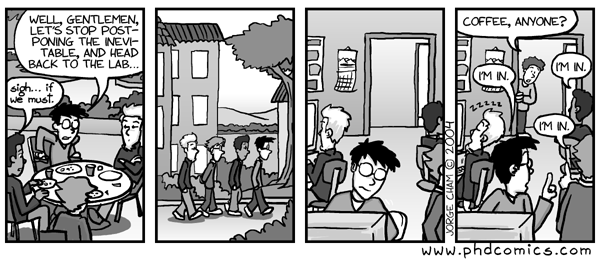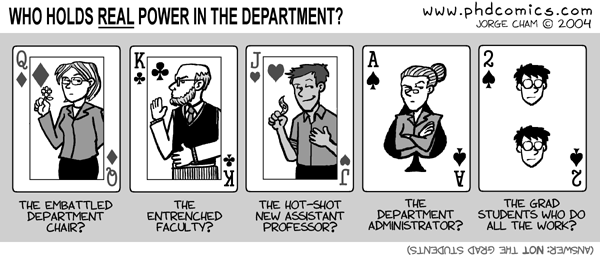Theories about Grad Student Poverty
Note: This entry slightly longer, reflecting the deep thought that has gone into it.
As a grad student, I've often thought about why we get paid the peanuts that we do (sponsors: please read that as, "Thank you for the bountiful funding, grant masters. I am forever greatful."). A fairly substantial national scholarship in Canada is worth $21k. Not too shabby, but also not too great. To put this in perspective, that comes out to be around $10/hour over a 2080 hour/year (2080 hours/year = 40 hours/week x 52 weeks). Under any model, that's pretty pathetic -- especially given a starting salary for a BSc in computer science is around $40k-$50k.
In my discussions with other impoverished grad students, I've come up with four possible theories about why grad students get paid so little: getting paid for hours worked, getting paid by value to society, paying your dues, and cognitive dissonance as a student retention policy. Of these, I prefer the last, but I suspect the real reason may be one of the first three.
1. Paying by the Hour
 One possibility is that assuming the standard 40 hour/week model is overestimating the time that grad students actually work on research. For example, if we assume that students only work for 1/4 of that time (as illustrated in the figure above), then that only works out to be about 10 hours/week, which ends up being about $40/hour: not actually that bad. Succinctly: "You're getting paid for how much you actually work."
One possibility is that assuming the standard 40 hour/week model is overestimating the time that grad students actually work on research. For example, if we assume that students only work for 1/4 of that time (as illustrated in the figure above), then that only works out to be about 10 hours/week, which ends up being about $40/hour: not actually that bad. Succinctly: "You're getting paid for how much you actually work."
2. Paid by Value to Society

Another possibility is to interpret one's pay as society's estimate of your work's value to society. The amount you get paid is "market value" for a person of your calibre doing the work that you are doing. Put more succinctly, "You're getting paid for what you're worth." Now these estimates are often right out of whack with reality (e.g. Basic Instinct 2, which had a budget for $70mil, but ended up only getting $5.8mil in gross domestic ticket sales), but it's probably fair to say most grad students' work is not worth much (I put my own stuff in that pile).
3. Paying Your Dues

A possibility recently brought up by Rock is that this underpaying of students is actually a perpetual cycle beginning in the early days of university. Like junior sumo wrestlers, who have to wake up first, and eat after all the senior sumo wrestlers have eaten, getting paid peanuts may just be the way the university puts grad students in their place: i.e. that they are paid grunt work. Put succinctly, this is the, "Back in my day, I walked to school uphill both ways, so you should too," theory.
4. Grad Student Retention Strategy
This is my favourite, and relies on a basic understanding of cognitive dissonance. The basic premise is that if two people, A and B were paid $1 and $20, respectively, for doing something boring... one week later, B would say the the job was lame, and A would be lukewarm about it. The reason is because B can justify doing the boring job by saying, "Hey I got paid for it," while A cannot justify his actions based on money, and instead must think, "Well, I must have done it because I enjoyed it." This is basically what's going on in hazing rituals, where after a hazing ritual, the person thinks, "Well if I'd gone through something that dreadful, I must really enjoy being part of this group."
The basic idea here then is that since we're suffering so much (i.e. getting paid so little), then we have to justify to ourselves that we actually /must/ be enjoying it -- otherwise, why would we still be here? Notice this is a perpetual cycle, and so it acts a graduate student retention strategy.
Summary
At this point, all of these theories seem very plausible to me. Regardless, one thing is strikingly clear: regardless of which slice of pie you take, it sucks to be getting paid a grad student stipend -- but hey, it's better than not getting anything at all! (Clearly, I'm buying into the cognitive dissonance they've set up.)
* Please note: I of course realise that we're very lucky to get paid to do what we do. I'm being dramatic (e.g. "impoverished") to be amusing. :-)
As a grad student, I've often thought about why we get paid the peanuts that we do (sponsors: please read that as, "Thank you for the bountiful funding, grant masters. I am forever greatful."). A fairly substantial national scholarship in Canada is worth $21k. Not too shabby, but also not too great. To put this in perspective, that comes out to be around $10/hour over a 2080 hour/year (2080 hours/year = 40 hours/week x 52 weeks). Under any model, that's pretty pathetic -- especially given a starting salary for a BSc in computer science is around $40k-$50k.
In my discussions with other impoverished grad students, I've come up with four possible theories about why grad students get paid so little: getting paid for hours worked, getting paid by value to society, paying your dues, and cognitive dissonance as a student retention policy. Of these, I prefer the last, but I suspect the real reason may be one of the first three.
1. Paying by the Hour
 One possibility is that assuming the standard 40 hour/week model is overestimating the time that grad students actually work on research. For example, if we assume that students only work for 1/4 of that time (as illustrated in the figure above), then that only works out to be about 10 hours/week, which ends up being about $40/hour: not actually that bad. Succinctly: "You're getting paid for how much you actually work."
One possibility is that assuming the standard 40 hour/week model is overestimating the time that grad students actually work on research. For example, if we assume that students only work for 1/4 of that time (as illustrated in the figure above), then that only works out to be about 10 hours/week, which ends up being about $40/hour: not actually that bad. Succinctly: "You're getting paid for how much you actually work."2. Paid by Value to Society

Another possibility is to interpret one's pay as society's estimate of your work's value to society. The amount you get paid is "market value" for a person of your calibre doing the work that you are doing. Put more succinctly, "You're getting paid for what you're worth." Now these estimates are often right out of whack with reality (e.g. Basic Instinct 2, which had a budget for $70mil, but ended up only getting $5.8mil in gross domestic ticket sales), but it's probably fair to say most grad students' work is not worth much (I put my own stuff in that pile).
3. Paying Your Dues

A possibility recently brought up by Rock is that this underpaying of students is actually a perpetual cycle beginning in the early days of university. Like junior sumo wrestlers, who have to wake up first, and eat after all the senior sumo wrestlers have eaten, getting paid peanuts may just be the way the university puts grad students in their place: i.e. that they are paid grunt work. Put succinctly, this is the, "Back in my day, I walked to school uphill both ways, so you should too," theory.
4. Grad Student Retention Strategy
This is my favourite, and relies on a basic understanding of cognitive dissonance. The basic premise is that if two people, A and B were paid $1 and $20, respectively, for doing something boring... one week later, B would say the the job was lame, and A would be lukewarm about it. The reason is because B can justify doing the boring job by saying, "Hey I got paid for it," while A cannot justify his actions based on money, and instead must think, "Well, I must have done it because I enjoyed it." This is basically what's going on in hazing rituals, where after a hazing ritual, the person thinks, "Well if I'd gone through something that dreadful, I must really enjoy being part of this group."
The basic idea here then is that since we're suffering so much (i.e. getting paid so little), then we have to justify to ourselves that we actually /must/ be enjoying it -- otherwise, why would we still be here? Notice this is a perpetual cycle, and so it acts a graduate student retention strategy.
Summary
At this point, all of these theories seem very plausible to me. Regardless, one thing is strikingly clear: regardless of which slice of pie you take, it sucks to be getting paid a grad student stipend -- but hey, it's better than not getting anything at all! (Clearly, I'm buying into the cognitive dissonance they've set up.)
* Please note: I of course realise that we're very lucky to get paid to do what we do. I'm being dramatic (e.g. "impoverished") to be amusing. :-)
